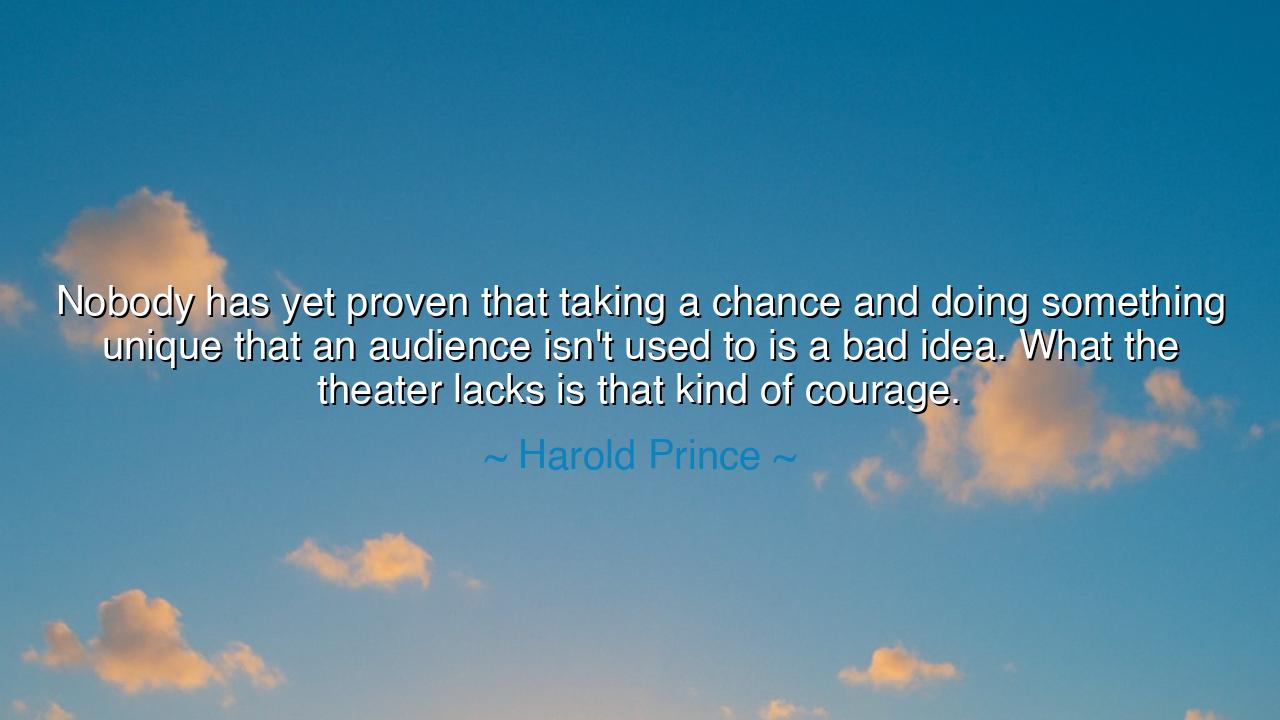
Nobody has yet proven that taking a chance and doing something
Nobody has yet proven that taking a chance and doing something unique that an audience isn't used to is a bad idea. What the theater lacks is that kind of courage.






"Nobody has yet proven that taking a chance and doing something unique that an audience isn't used to is a bad idea. What the theater lacks is that kind of courage." These words, spoken by the legendary Harold Prince, resonate deeply with the soul of creation and the boundless power of innovation. In them, Prince speaks not just to the world of theater, but to the very essence of human courage and the audacity to challenge the status quo. To take a chance, to do something unique, is to dance with the unknown, to step into a realm where certainty is cast aside in favor of exploration and the pursuit of something greater. For what is art, in all its forms, but the boldness to push the boundaries of what is familiar and expected?
In the ancient world, creativity was regarded as a divine gift, a force that came not from conformity, but from a deep well of individual expression. Consider the Greek tragedians, those great masters of theater who dared to defy the conventions of their time. Sophocles, Euripides, and Aeschylus—these playwrights revolutionized the stage by introducing not just new characters and plots, but by challenging the very foundations of human existence. Their works, filled with raw emotion and existential exploration, were not merely performances; they were catalysts for social and philosophical change. The gods themselves were invoked in moments of anguish, and the fate of man was questioned in the deepest, most intimate ways. Their willingness to take risks, to explore unfamiliar territory, was the lifeblood of the ancient stage. The more they challenged their audiences, the more they revealed truths that were hidden in the hearts of humanity.
But this courage to step into the unknown, to take a chance and push boundaries, has often been met with resistance. In the world of theater, as in any art form, there is a constant tension between the old and the new, between tradition and innovation. Shakespeare, a towering figure of theatrical history, faced criticism when he broke from the classical tradition of his time, introducing complex characters, layered themes, and language that transcended the simplicity of earlier plays. Yet, despite the skepticism of some, his works changed the course of theater, and his legacy has endured for centuries. Shakespeare’s success did not come from adhering to the old ways, but from daring to reimagine the stage and the very nature of human storytelling.
Similarly, in the 20th century, Stanislavski, the Russian theater director, revolutionized acting with his development of the method of acting. His ideas—radical at the time—called for actors to dig deeper into their own emotions and experiences to bring truth to their characters. This was a departure from the more formalized techniques of earlier traditions, and though it was met with resistance, Stanislavski’s work became the foundation for modern acting. It was a prime example of the kind of courage Prince speaks of—the courage to take chances, to experiment, and to break from established norms to create something more real, more human.
Prince’s call for courage in theater is not just a plea for innovation but for the essential spirit of creativity that lies within us all. The courage to break from tradition is not a sign of disrespect but of growth. It is a reflection of the unyielding drive to improve, to challenge, and to explore new possibilities. This courage is the lifeblood of not just the arts, but of all human endeavor. Whether in science, politics, or personal development, the most profound advancements have often come when individuals or groups dared to question the norms and embrace the unknown. Galileo, when he spoke of the heliocentric model, was condemned for challenging the established worldview. Yet, it was this boldness that changed our understanding of the universe forever.
The lesson here, then, is not just for the theater but for all of us: take the chance. Do not be afraid of stepping into the unknown, for it is in these moments that we truly begin to learn and grow. Whether it is in our professional lives, in relationships, or in our pursuit of personal passions, we must dare to be different, to do what has not yet been done, to break free from the shackles of convention. History is made not by those who follow the safe path but by those who create a new one, by those who take risks and show others the possibilities of what can be.
And so, as you walk your own path in life, remember Prince's call for courage. Take the leap, embrace the unknown, and trust that in the risks you take, there are opportunities waiting to be discovered. Let your life be a stage, a canvas, a creation that challenges not only the world around you but, in the process, your very self. For in the courage to break free from the ordinary, you may find the extraordinary waiting just beyond the horizon.






AAdministratorAdministrator
Welcome, honored guests. Please leave a comment, we will respond soon